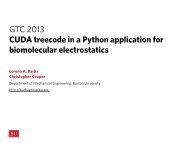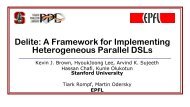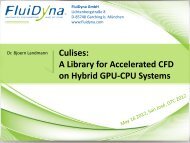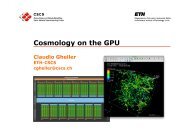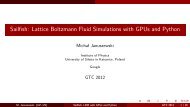KernelGen - GPU Technology Conference
KernelGen - GPU Technology Conference
KernelGen - GPU Technology Conference
- No tags were found...
Create successful ePaper yourself
Turn your PDF publications into a flip-book with our unique Google optimized e-Paper software.
Simple example: Fortran.Compile the Fortran example as usual, just use kernelgen-gfortran instead of gfortran:$ kernelgen-gfortran -O3 example_f.f90 -o example_f<strong>KernelGen</strong> always generates binaries usable both on CPU and <strong>GPU</strong>. To execute the regular version,run it as usual:$ ./example_f 512 256 256compute time = . 1.8481150maxval = 1.5707963 minval = 1.5707963In order to run <strong>GPU</strong>-accelerated version, simply set kernelgen_runmode environment variable to 1:$ kernelgen_runmode=1 ./example_f 512 256 256compute time = . 0.28801799maxval = 1.5707964 minval = 1.57079644 / 75
Simple example: C.1 #include 2 #include 3 #include 4 #include 5 #include 67 int main(int argc, char* argv[]) {89 int nx = atoi(argv[1]);10 int ny = atoi(argv[2]);11 int ns = atoi(argv[3]);1213 size_t szarray = nx * ny * ns;14 size_t szarrayb = szarray * sizeof(float);1516 float* x = (float*)malloc(szarrayb);17 float* y = (float*)malloc(szarrayb);18 float* xy = (float*)malloc(szarrayb);1920 for (int i = 0; i < szarray; i++)21 {22 x[i] = atan(1.0);23 y[i] = x[i];24 }25 struct timeval start, finish;gettimeofday(&start, NULL);for (int k = 0; k < ns; k++)for (int j = 0; j < ny; j++)for (int i = 0; i < nx; i++){int idx = i + nx * (j + ny * k);. xy[idx] = asinf(sinf(x[idx])) + acosf(cosf(y[idx]));}gettimeofday(&finish, NULL);printf(”compute time = %f\n”,get_time_diff(&start, &finish));float minval = xy[0], maxval = xy[0];for (int i = 0; i < szarray; i++){if (minval > xy[i]) minval = xy[i];if (maxval < xy[i]) maxval = xy[i];}printf(”maxval = %f, minval = %f\n”, maxval, minval);// Deallocate arrays.free(x); free(y); free(xy);return 0;}262728293031323334353637383940414243444546474849505 / 75
Simple example: C.Compile the Fortran example as usual, just use kernelgen-gcc instead of gcc:$ kernelgen-gcc -O3 -std=c99 example_c.c -o example_c<strong>KernelGen</strong> always generates binaries usable both on CPU and <strong>GPU</strong>. To execute the regular version,run it as usual:$ ./example_c 512 256 256compute time = .1.848575maxval = 1.570796, minval = 1.570796In order to run <strong>GPU</strong>-accelerated version, simply set kernelgen_runmode environment variable to 1:$ kernelgen_runmode=1 ./example_c 512 256 256compute time = .0.293359maxval = 1.570796, minval = 1.5707966 / 75
Current limitations of OpenACC compilers..OpenACC currently focuses on immediate acceleration benefits in small and average codes, andcould hardly be shifted to broader scope without addressing the following limitations:External calls – support of external calls in accelerated loops is a must for big projects,where functionality is distributed between multiple code units, for instance, Fortranmodules.Pointers analysis – in many circumstances compiler cannot reliably determine therelationship between pointers and memory access ranges, requiring user to provideadditional information with directives.⇒ Should one sacrifice code design and integrity for the benefit of acceleration?7 / 75
OpenACC: no external calls.OpenACC compilers do not allow calls from different compilation units:sincos.f90!$acc paralleldo k = 1, nzdo j = 1, nydo i = 1, nxxy(i, j, k) = sincos_ijk(x(i, j, k), y(i, j, k))enddoenddoenddo!$acc end parallelfunction sincos_ijk(x, y)function.f90implicit nonereal, intent(in) :: x, yreal :: sincos_ijksincos_ijk = sin(x) + cos(y)end function sincos_ijkpgfortran -fast -Mnomain -Minfo=accel -ta=nvidia,time -Mcuda=keepgpu,keepbin,keepptx,←↪ptxinfo -c ../sincos.f90 -o sincos.oPGF90-W-0155-Accelerator region ignored; see -Minfo messages (../sincos.f90: 33)sincos:33, Accelerator region ignored36, .Accelerator restriction: function/procedure calls are not supported37, Accelerator restriction: unsupported call to sincos_ijk8 / 75
<strong>KernelGen</strong>: can handle external calls.Dependency resolution during linkingKernels generation in runtime}⇒Support for external calls definedin other objects or static librariessincos.f90function.f90!$acc paralleldo k = 1, nzdo j = 1, nydo i = 1, nxxy(i, j, k) = sincos_ijk(x(i, j, k), y(i, j, k))enddoenddoenddo!$acc end parallelfunction sincos_ijk(x, y)implicit nonereal, intent(in) :: x, yreal :: sincos_ijksincos_ijk = sin(x) + cos(y)end function sincos_ijkLaunching kernel __kernelgen_sincos__loop_3blockDim = { 32, 4, 4 }gridDim = { 16, 128, 16 }Finishing kernel __kernelgen_sincos__loop_3__kernelgen_sincos__loop_3 time = 4.986428e-03 sec9 / 75
<strong>KernelGen</strong>: and external static libraries.Thanks to cutomized LTO wrapper, <strong>KernelGen</strong> can extract kernels dependencies fromstatic libraries:kernelgen-gcc -std=c99 -c ../main.c -o main.okernelgen-gfortran -c ../sincos.f90 -o sincos.okernelgen-gfortran -c ../function.f90 -o function.o.ar rcs libfunction.a function.o.kernelgen-gfortran main.o sincos.o -o function -L. -lfunction$ kernelgen_runmode=1 ./function 512 512 64__kernelgen_sincos__loop_3: regcount = 22, size = 512Loaded ’__kernelgen_sincos__loop_3’ at: 0xc178f0Launching kernel __kernelgen_sincos__loop_3blockDim = { 32, 4, 4 }gridDim = { 16, 128, 16 }Finishing kernel __kernelgen_sincos__loop_3__kernelgen_sincos__loop_3 time = 4.974710e-03 sec10 / 75
OpenACC: no pointers tracking.Compiler cannot determine relationships between pointers and data ranges:sincos.cvoid sincos(int nx, int ny, int nz, float* x, float* y, float* xy) {#pragma acc parallelfor (int k = 0; k < nz; k++)for (int j = 0; j < ny; j++)for (int i = 0; i < nx; i++) {int idx = i + nx * j + nx * ny * k;xy[idx] = sin(x[idx]) + cos(y[idx]);}}pgcc -fast -Minfo=accel -ta=nvidia,time -Mcuda=keepgpu,keepbin,keepptx,ptxinfo -c ../sincos.c -o sincos.oPGC-W-0155-Compiler failed to translate accelerator region (see -Minfo messages): Could not find allocated-variable index ←↪for symbol (../sincos.c: 27)sincos:27, Accelerator kernel generated28, .Complex loop carried dependence of *(y) prevents parallelizationComplex loop carried dependence of *(x) prevents parallelizationComplex loop carried dependence of *(xy) prevents parallelization...30, .Accelerator restriction: size of the <strong>GPU</strong> copy of xy is unknown11 / 75
<strong>KernelGen</strong>: smart pointers tracking.Pointer alias analysis is performed in runtime, assisted with addresses substitution:for (c2=0;c2= 47246749696 + 1048576i0 + 2048i1 + 4i2 and o0←↪ NULL[o0] : o0 >= 47313862656 + 1048576i0 + 2048i1 + 4i2 and o0←↪ NULL[o0] : o0 >= 47380975616 + 1048576i0 + 2048i1 + 4i2 and o0←↪
<strong>KernelGen</strong>: smart pointers tracking.Pointer alias analysis is performed in runtime, assisted with addresses substitution:for (c2=0;c2= 47246749696 + 1048576i0 + 2048i1 + 4i2 and o0←↪ NULL[o0] : o0 >= 47313862656 + 1048576i0 + 2048i1 + 4i2 and o0←↪ NULL[o0] : o0 >= 47380975616 + 1048576i0 + 2048i1 + 4i2 and o0←↪
<strong>KernelGen</strong>: smart pointers tracking.Pointer alias analysis is performed in runtime, assisted with addresses substitution:for (c2=0;c2= 47246749696 + 1048576i0 + 2048i1 + 4i2 and o0←↪ NULL[o0] : o0 >= 47313862656 + 1048576i0 + 2048i1 + 4i2 and o0←↪}. NULL[o0] : o0 >= 47380975616 + 1048576i0 + 2048i1 + 4i2 and o0←↪
<strong>KernelGen</strong>: smart pointers tracking.Pointer alias analysis is performed in runtime, assisted with addresses substitution:sincos.cvoid sincos(int nx, int ny, int nz, float* x, float* y, float* xy) {#pragma acc parallelfor (int k = 0; k < nz; k++)for (int j = 0; j < ny; j++)for (int i = 0; i < nx; i++) {int idx = i + nx * j + nx * ny * k;xy[idx] = sin(x[idx]) + cos(y[idx]);}}resultLaunching kernel __kernelgen_sincos_loop_10blockDim = { 32, 4, 4 }gridDim = { 16, 128, 16 }Finishing kernel __kernelgen_sincos_loop_10__kernelgen_sincos_loop_10 time = 2.300006e-02 sec15 / 75
Other nice features..Comfortable acceleration framework should be designed, taking in account properties of the supportedlanguages and common habits of developers, for instance:Handle different forms of loops, not only arithmetic for/doParallelize implicit loops (Fortran array-wise statements, elemental functions, etc.)Pointer arithmetics (C/C++)...16 / 75
Parallelizing while-loops.Thanks to the nature of LLVM and Polly, <strong>KernelGen</strong> can parallelize while-loops semantically equivalentto for-loops (OpenACC can’t):i = 1do while (i .le. nx)j = 1do while (j .le. nz)k = 1do while (k .le. ny)C(i, j) = C(i, j) + A(i, k) * B(k, j)k = k + 1enddoj = j + 1enddoi = i + 1enddoLaunching kernel __kernelgen_matmul__loop_9blockDim = { 32, 32, 1 }gridDim = { 2, 16, 1 }Finishing kernel __kernelgen_matmul__loop_9__kernelgen_matmul__loop_9 time = 0.00953514 sec17 / 75
Parallelizing Fortran array-wise code.Fortran array-wise statements are expanded into plain loops inside compiler frontend.For this reason, <strong>KernelGen</strong> is able to parallelize them into <strong>GPU</strong> kernels, for instance:1 program demo23 implicit none4 integer :: n5 complex*16, allocatable, dimension(:) :: c1, c2,←↪z6 character(len=128) :: arg7 integer :: i8 real*8 :: v1, v29 real :: start, finish1011 call get_command_argument(1, arg)12 read(arg, ’(I64)’) n1314 ! Allocate data arrays.15 allocate(c1(n), c2(n), z(n))1617 ! Initialize arrays.18 do i = 1, n19 call random_number(v1)20 call random_number(v2)c1(i) = cmplx(v1, v2)call random_number(v1)call random_number(v2)c2(i) = cmplx(v1, v2)enddo! Implicit computational loopcall cpu_time(start).z = conjg(c1) * c2call cpu_time(finish)write(*,*) ’compute time = ’, finish - startprint *, ’z min = (’, minval(realpart(z)), &’, ’, minval(imagpart(z)), ’), max = (’, &maxval(realpart(z)), ’, ’, minval(imagpart(z)), ’)’! Deallocate arrays.deallocate(c1, c2, z)end program demo21222324252627282930313233343536373839404118 / 75
Parallelizing Fortran array-wise code.Compile the Fortran example as usual, just use kernelgen-gfortran instead of gfortran:$ kernelgen-gfortran -O3 -std=c99 conjg.f90 -o conjg$ ./conjg $((256*256*256))compute time = . 0.10800600z min = ( 7.18319034686704879E-006 , -0.99788337878880551 ), max = ( ←↪1.9723582564715194 , -0.99788337878880551 )$ kernelgen_runmode=1 ./conjg $((256*256*256))compute time = . 2.80020237E-02z min = ( 7.18319034686704879E-006 , -0.99788337878880551 ), max = ( ←↪1.9723582564715194 , -0.99788337878880551 )19 / 75
OpenACC: no pointer arithmetics.Compiler cannot parallelize loops containing pointer arithmetics:sincos.cvoid sincos(int nx, int ny, int nz, float* x, float* y, float* xy) {float *xp = x, *yp = y, *xyp = xy;#pragma acc parallelfor (int k = 0; k < nz; k++)for (int j = 0; j < ny; j++)for (int i = 0; i < nx; i++). *(xyp++) = sin(*(xp++)) + cos(*(yp++));}$ makepgcc -fast -Minfo=accel -ta=nvidia,time -Mcuda=keepgpu,keepbin,keepptx,ptxinfo -c ../sincos.c -o sincos.oPGC-W-0155-.Pointer assignments are not supported in accelerator regions: xyp (../sincos.c: 34)PGC-W-0155-Accelerator region ignored (../sincos.c: 29)PGC/x86-64 Linux 13.2-0: compilation completed with warnings20 / 75
<strong>KernelGen</strong>: pointer arithmetics support.In LLVM/Polly used by <strong>KernelGen</strong> all arrays accesses are lowered to pointers, thus there is nodifference between indexed arrays and pointer arithmetics, both are supported:sincos.cvoid sincos(int nx, int ny, int nz, float* x, float* y, float* xy) {float *xp = x, *yp = y, *xyp = xy;#pragma acc parallelfor (int k = 0; k < nz; k++)for (int j = 0; j < ny; j++)for (int i = 0; i < nx; i++). *(xyp++) = sin(*(xp++)) + cos(*(yp++));}Launching kernel __kernelgen_sincos_loop_10blockDim = { 32, 4, 4 }gridDim = { 16, 128, 16 }Finishing kernel __kernelgen_sincos_loop_10__kernelgen_sincos_loop_10 time = 2.298868e-02 sec21 / 75
absolute speedup against PGI version4.543.532.521.510.50Performance: <strong>KernelGen</strong> vs PGI OpenACC.divergencegameoflifegaussblurgradientjacobilapgsrblaplacianmatmulmatvecsincostricubicuxx1c2075gtx680mgtx680vecaddwave13ptTests precision mode: doubleSoftware: <strong>KernelGen</strong> r1740,PGI OpenACC 13.2Hardware: NVIDIA Tesla C2075(GF110, sm_20), NVIDIA GTX680M (GK104, sm_30), NVIDIAGTX 680 (GK104, sm_30)Values above 1 – <strong>KernelGen</strong>kernel is faster than PGI,values below 1 – PGI kernel isfaster than <strong>KernelGen</strong> (on thesame <strong>GPU</strong>)Measurements are averagedfrom 10 invocations of all testsand 10 iterations inside everytest24 / 75
Performance factors: cache config.1 Cache config Since current kernels generator does not utilize shared memory, in <strong>KernelGen</strong>cache mode is configured to larger L1 cache, giving some additional speedup// Since <strong>KernelGen</strong> does not utilize shared memory at the moment,// use larger L1 cache by default.CU_SAFE_CALL(cuCtxSetCacheConfig(CU_FUNC_CACHE_PREFER_L1));25 / 75
Performance factors: compute grid.2 <strong>KernelGen</strong> uses {128, 1, 1} blocks and 3D grid, while PGI uses {128, 1} blocks and 2Dgrid. Previously we used {32, 4, 4}, which was slower.PGI and <strong>KernelGen</strong> profilers reports for divergence test, single precision, 512 × 256 × 256 problem:Accelerator Kernel Timing data/home/marcusmae/forge/kernelgen/tests/perf/divergence/pgi/../divergence.cdivergence NVIDIA devicenum=0time(us): 154,66062: kernel launched 10 times. grid: [4x254] block: [128]device time(us): total=154,660 max=15,560 min=15,373 .avg=15,466elapsed time(us): total=154,742 max=15,570 min=15,381 avg=15,474Kernel function call __kernelgen_divergence_loop_10__kernelgen_divergence_loop_10 @ 0xeb32b61a9530d97f53f77c5abbd67132Launching kernel __kernelgen_divergence_loop_10. blockDim = { 128, 1, 1 }. gridDim = { 4, 254, 254 }Finishing kernel __kernelgen_divergence_loop_10__kernelgen_divergence_loop_10 time = .7.912811e-03 sec26 / 75
Performance factors: code optimization.3 <strong>KernelGen</strong> under-optimizes <strong>GPU</strong> math (sincos) and stores in reduction (matmul, matvec):CUDA.LoopHeader.x.preheader:; preds = %”Loop Function Root”%p_newGEPInst.cloned = getelementptr float* inttoptr (i64 47380979712 to float*)store float 0.000000e+00, float * %p_newGEPInst.cloned%p_.moved.to.4.cloned = shl nsw i64 %3, 9br label %polly.loop_bodyCUDA.AfterLoop.x:; preds = %polly.loop_body, %”Loop Function Root”ret voidpolly.loop_body:; preds = %polly.loop_body, %CUDA.LoopHeader.x.preheader%_p_scalar_ = phi float [ 0.000000e+00, %CUDA.LoopHeader.x.preheader ], [ %p_8, %polly.loop_body ]%polly.loopiv10 = phi i64 [ 0, %CUDA.LoopHeader.x.preheader ], [ %polly.next_loopiv, %polly.loop_body ]%polly.next_loopiv = add i64 %polly.loopiv10, 1%p_ = add i64 %polly.loopiv10, %p_.moved.to.4.cloned%p_newGEPInst9.cloned = getelementptr float* inttoptr (i64 47246749696 to float*), i64 %p_%p_newGEPInst12.cloned = getelementptr float* inttoptr (i64 47380971520 to float*), i64 %polly.loopiv10%_p_scalar_5 = load float* %p_newGEPInst9.cloned%_p_scalar_6 = load float* %p_newGEPInst12.cloned%p_7 = fmul float %_p_scalar_5, %_p_scalar_6%p_8 = fadd float %_p_scalar_, %p_7store float %p_8, float* %p_newGEPInst.cloned%exitcond = icmp eq i64 %polly.next_loopiv, 512br i1 %exitcond, label %CUDA.AfterLoop.x, label %polly.loop_body27 / 75
Performance factors: code optimization.3 <strong>KernelGen</strong> under-optimizes <strong>GPU</strong> math (sincos) and stores in reduction (matmul, matvec):.CUDA.LoopHeader.x.preheader:; preds = %”Loop Function Root”%p_newGEPInst.cloned = getelementptr float* inttoptr (i64 47380979712 to float*)store float 0.000000e+00, float * %p_newGEPInst.cloned%p_.moved.to.4.cloned = shl nsw i64 %3, 9br label %polly.loop_body.CUDA.AfterLoop.x:; preds = %polly.loop_body, %”Loop Function Root”ret void.polly.loop_body:; preds = %polly.loop_body, %CUDA.LoopHeader.x.preheader%_p_scalar_ = phi float [ 0.000000e+00, %CUDA.LoopHeader.x.preheader ], [ %p_8, %polly.loop_body ]%polly.loopiv10 = phi i64 [ 0, %CUDA.LoopHeader.x.preheader ], [ %polly.next_loopiv, %polly.loop_body ]%polly.next_loopiv = add i64 %polly.loopiv10, 1%p_ = add i64 %polly.loopiv10, %p_.moved.to.4.cloned%p_newGEPInst9.cloned = getelementptr float* inttoptr (i64 47246749696 to float*), i64 %p_%p_newGEPInst12.cloned = getelementptr float* inttoptr (i64 47380971520 to float*), i64 %polly.loopiv10%_p_scalar_5 = load float* %p_newGEPInst9.cloned%_p_scalar_6 = load float* %p_newGEPInst12.cloned%p_7 = fmul float %_p_scalar_5, %_p_scalar_6%p_8 = fadd float %_p_scalar_, %p_7store float %p_8, float* %p_newGEPInst.cloned. %exitcond = icmp eq i64 %polly.next_loopiv, 512. br i1 %exitcond, label %CUDA.AfterLoop.x, label %polly.loop_bodyMarked out lines are header, tail andbody of loop, as it looks like in LLVM IR.28 / 75
Performance factors: code optimization.3 <strong>KernelGen</strong> under-optimizes <strong>GPU</strong> math (sincos) and stores in reduction (matmul, matvec):CUDA.LoopHeader.x.preheader:; preds = %”Loop Function Root”. %p_newGEPInst.cloned = getelementptr float* inttoptr (i64 47380979712 to float*). store float 0.000000e+00, float * %p_newGEPInst.cloned%p_.moved.to.4.cloned = shl nsw i64 %3, 9br label %polly.loop_bodyCUDA.AfterLoop.x:; preds = %polly.loop_body, %”Loop Function Root”ret voidpolly.loop_body:; preds = %polly.loop_body, %CUDA.LoopHeader.x.preheader%_p_scalar_ = phi float [ 0.000000e+00, %CUDA.LoopHeader.x.preheader ], [ %p_8, %polly.loop_body ]%polly.loopiv10 = phi i64 [ 0, %CUDA.LoopHeader.x.preheader ], [ %polly.next_loopiv, %polly.loop_body ]%polly.next_loopiv = add i64 %polly.loopiv10, 1%p_ = add i64 %polly.loopiv10, %p_.moved.to.4.cloned%p_newGEPInst9.cloned = getelementptr float* inttoptr (i64 47246749696 to float*), i64 %p_%p_newGEPInst12.cloned = getelementptr float* inttoptr (i64 47380971520 to float*), i64 %polly.loopiv10%_p_scalar_5 = load float* %p_newGEPInst9.cloned%_p_scalar_6 = load float* %p_newGEPInst12.cloned%p_7 = fmul float %_p_scalar_5, %_p_scalar_6%p_8 = fadd float %_p_scalar_, %p_7. store float %p_8, float* %p_newGEPInst.cloned%exitcond = icmp eq i64 %polly.next_loopiv, 512br i1 %exitcond, label %CUDA.AfterLoop.x, label %polly.loop_bodyProperly optimized reduction should accumulatesum on register and store it(memory operation) at the end only once.Here store is performed on every iteration!.29 / 75
Performance factors: code generation.4 PGI is a source-to-source compiler, while <strong>KernelGen</strong> is a full compiler, thanks to LLVMPGI:NVPTX backendPGI: frontend PGI: optimization C Backend CUDA compiler (NVCC) PTX<strong>KernelGen</strong>:GCC: frontend LLVM: optimization LLVM NVPTX backend PTX30 / 75
absolute speedup against CPU version180160140120100806040200Performance: <strong>KernelGen</strong> vs CPU.divergencegameoflifegaussblurgradientjacobilapgsrblaplacianmatmulmatvecsincostricubicuxx1c2075gtx680mgtx680vecaddwave13ptTests precision mode: singleSoftware: <strong>KernelGen</strong> r1740,GCC 4.6.4Hardware: NVIDIA Tesla C2075(GF110, sm_20), NVIDIA GTX680M (GK104, sm_30), NVIDIAGTX 680 (GK104, sm_30), IntelCore i7-3610QM CPU 2.30GHzMeasurements are averagedfrom 10 invocations of all testsand 10 iterations inside everytestValues above 1 – <strong>KernelGen</strong><strong>GPU</strong> kernel is faster than GCCCPU kernel, values below 1 –GCC is faster than <strong>KernelGen</strong>CPU version is single-core31 / 75
absolute speedup against CPU version140120100806040200Performance: <strong>KernelGen</strong> vs CPU.divergencegameoflifegaussblurgradientjacobilapgsrblaplacianmatmulmatvecsincostricubicc2075gtx680mgtx680uxx1vecaddwave13ptTests precision mode: doubleSoftware: <strong>KernelGen</strong> r1740,GCC 4.6.4Hardware: NVIDIA Tesla C2075(GF110, sm_20), NVIDIA GTX680M (GK104, sm_30), NVIDIAGTX 680 (GK104, sm_30), IntelCore i7-3610QM CPU 2.30GHzMeasurements are averagedfrom 10 invocations of all testsand 10 iterations inside everytestValues above 1 – <strong>KernelGen</strong><strong>GPU</strong> kernel is faster than GCCCPU kernel, values below 1 –GCC is faster than <strong>KernelGen</strong>CPU version is single-core32 / 75
Parallelism detection..<strong>KernelGen</strong> analyses loops dependencies and maps parallel loops on <strong>GPU</strong> compute grid.Sequential loops are kept unchanged, either inner or outer.1 subroutine match_filter(HH, szhh, XX, szxx, YY, szyy)23 implicit none4 integer(kind=IKIND), intent(in) :: szhh, szxx, szyy5 real(kind=RKIND), intent(in) :: HH(szhh), XX(szxx)6 real(kind=RKIND), intent(out) :: YY(szyy)7 integer(kind=IKIND) :: i, j8 integer, parameter :: rkind = RKIND910 ! This loop will be parallelized11 do i = 1, szyy12 YY(i) = 0.0_rkind13 ! This loop will not be parallelized14 do j = 1, szhh15 YY(i) = YY(i) + XX(i + j - 1) * HH(j)16 enddo17 enddo1819 end subroutine match_filter33 / 75
Parallelism detection.<strong>KernelGen</strong> analyses loops dependencies and maps parallel loops on <strong>GPU</strong> compute grid.Sequential loops are kept unchanged, either inner or outer.1 subroutine match_filter(HH, szhh, XX, szxx, YY, szyy)23 implicit none4 integer(kind=IKIND), intent(in) :: szhh, szxx, szyy5 real(kind=RKIND), intent(in) :: HH(szhh), XX(szxx)6 real(kind=RKIND), intent(out) :: YY(szyy)7 integer(kind=IKIND) :: i, j8 integer, parameter :: rkind = RKIND910 ! This loop will be parallelized11 do i = 1, szyy12 YY(i) = 0.0_rkind13 ! This loop will not be parallelized14 . do j = 1, szhh15 YY(i) = YY(i) + XX(i + j - 1) * HH(j)16 . enddo17 enddo1819 end subroutine match_filterParallelization of reduction loops notyet supported, this loop will be serial34 / 75
Parallelism detection.<strong>KernelGen</strong> analyses loops dependencies and maps parallel loops on <strong>GPU</strong> compute grid.Sequential loops are kept unchanged, either inner or outer.1 subroutine match_filter(HH, szhh, XX, szxx, YY, szyy)23 implicit none4 integer(kind=IKIND), intent(in) :: szhh, szxx, szyy5 real(kind=RKIND), intent(in) :: HH(szhh), XX(szxx)6 real(kind=RKIND), intent(out) :: YY(szyy)7 integer(kind=IKIND) :: i, j8 integer, parameter :: rkind = RKIND910 ! This loop will be parallelized11 . do i = 1, szyy12 YY(i) = 0.0_rkind13 ! This loop will not be parallelized14 do j = 1, szhh15 YY(i) = YY(i) + XX(i + j - 1) * HH(j)16 enddo17 . enddo1819 end subroutine match_filterHowever, the outer loop will be detectedparallel and taken on <strong>GPU</strong>, with innerserial loop processed by each thread35 / 75
Cooperation with MPI..<strong>KernelGen</strong> naturally co-exists with MPI parallelism, assigning each MPI process a single <strong>GPU</strong>:Solution time, seconds10010131.171.58015.590.82510.420.5717.810.4506.490.3830.11 3 5 7 9 115.414.654.063.61The number of MPI processes used (1 <strong>GPU</strong> per process)3.252.982.83CPU time<strong>GPU</strong> timeComparing performance of time domain matched filter application, compiled with <strong>KernelGen</strong> r1740 for 1-12 cores of Intel Xeon X5670CPUs and 1-5 NVIDIA Tesla C2070 <strong>GPU</strong>s (Fermi sm_20)36 / 75
<strong>KernelGen</strong> dependencies.GCC – for frontends and regular compiling pipeline (GPL)DragonEgg – GCC plugin for converting GCC’s IR (gimple) into LLVM IR (GPL)LLVM – for internal compiler infrastructure (BSD)Polly – for loops parallelism analysis (BSD+GPL)NVPTX backend – for emitting LLVM IR into PTX/<strong>GPU</strong> intermediate assembly (BSD)PTXAS – for emitting PTX/<strong>GPU</strong> into target <strong>GPU</strong> ISA (proprietary, no source code)AsFermi – for necessary CUBIN-level tricks in Fermi <strong>GPU</strong> ISA (MIT/BSD)NVIDIA <strong>GPU</strong> driver – for deploying the resulting code on <strong>GPU</strong>s (proprietary, no source code)37 / 75
<strong>KernelGen</strong> compiler pipeline.<strong>KernelGen</strong> conserves original host compiler pipeline (based on GCC), extending it with parallelLLVM-based pipeline, which is activated and/or used if specific environment variables are set.1. Compile-time1.1. Generate binary CPU code1.2. Generate LLVM IR code1.3. Branch loops into separatefunctions in LLVM IR1.4. Embed LLVM IR for loopsinto object file2. Link-time2.1. Load LLVM IR form objects2.2. Extract main entry intoseparate LLVM IR module2.3. Resolve (link) dependenciesin LLVM IR code2.4. Embed LLVM IR modules forloops and main entry into executablebinary3. Run-time3.1. Load LLVM IR from binary3.2. Load external LLVM IR formath and workflow control3.3. Optimize, codegen & launch<strong>GPU</strong> kernel for main entry,from LLVM IR3.4. Analyze, optimize, codegen& launch <strong>GPU</strong> kernels for<strong>GPU</strong>-efficient loops, from LLVM IR3.5. Handle CPU host calls38 / 75
<strong>GPU</strong>-directed execution.<strong>GPU</strong>dataon <strong>GPU</strong>CPU.idleserialcodeparallelcodeserialcodeserialcodeinitidlecallbackcallbackcallbackhostcallcallback<strong>KernelGen</strong> uses <strong>GPU</strong>-directed execution model:All activities are initiated by <strong>GPU</strong> (CPU is “passive”)All data (global, dynamic, immediate) resides <strong>GPU</strong>memory<strong>GPU</strong> data and control flow are managed by main kernel,which is persistent on <strong>GPU</strong> during whole applicationlifetimefinalize39 / 75
<strong>GPU</strong>-directed execution.<strong>GPU</strong>idleserialcodeparallelcodeserialcodeserialcodedataon <strong>GPU</strong>CPUinitidlecallbackcallbackcallbackhostcallcallbackfinalize<strong>GPU</strong>-directed execution model benefits:No need to manage host↔device memory transfersexplicitly and track hidden data dependencies(side-effects)Possibility to utilize long uninterrupted kernels withdynamic parallelism, where availableTransparent transition of CPU MPI nodes into <strong>GPU</strong> MPInodes, with CUDA-aware MPI<strong>GPU</strong> device functions initially loaded with main kernelare shared with all other dynamically loaded kernels,minimizing compilation time and code size (in contrast,OpenACC and CUDA kernels must be self-containing)40 / 75
<strong>KernelGen</strong> execution workflow.Scenario 1: main kernel approached a point where another <strong>GPU</strong> kernel can be launched (for parallelloop). In this case, another kernel is launched via host callback (could be replaced withdynamic parallelism on Kepler sm_35). All <strong>GPU</strong> data is shared (.local data is disabled).CPUversionswitch<strong>GPU</strong>stream #2(many threads)<strong>GPU</strong>stream #1(single thread)41 / 75
<strong>KernelGen</strong> execution workflow.Scenario 1: main kernel approached a point where another <strong>GPU</strong> kernel can be launched (for parallelloop). In this case, another kernel is launched via host callback (could be replaced withdynamic parallelism on Kepler sm_35). All <strong>GPU</strong> data is shared (.local data is disabled).CPUversionswitchcompilemain kernel<strong>GPU</strong>stream #2(many threads)<strong>GPU</strong>stream #1(single thread)42 / 75
<strong>KernelGen</strong> execution workflow.Scenario 1: main kernel approached a point where another <strong>GPU</strong> kernel can be launched (for parallelloop). In this case, another kernel is launched via host callback (could be replaced withdynamic parallelism on Kepler sm_35). All <strong>GPU</strong> data is shared (.local data is disabled).CPUversionswitchcompilemain kernel<strong>GPU</strong>stream #2(many threads)<strong>GPU</strong>stream #1(single thread)launchmain kernel43 / 75
<strong>KernelGen</strong> execution workflow.Scenario 1: main kernel approached a point where another <strong>GPU</strong> kernel can be launched (for parallelloop). In this case, another kernel is launched via host callback (could be replaced withdynamic parallelism on Kepler sm_35). All <strong>GPU</strong> data is shared (.local data is disabled).CPUversionswitchcompilemain kernelcallback: requested loopkernel JIT-compile&launch<strong>GPU</strong>stream #2(many threads)<strong>GPU</strong>stream #1(single thread)launchmain kernel44 / 75
<strong>KernelGen</strong> execution workflow.Scenario 1: main kernel approached a point where another <strong>GPU</strong> kernel can be launched (for parallelloop). In this case, another kernel is launched via host callback (could be replaced withdynamic parallelism on Kepler sm_35). All <strong>GPU</strong> data is shared (.local data is disabled).CPU<strong>GPU</strong>stream #2(many threads)<strong>GPU</strong>stream #1(single thread)versionswitchcompilemain kernellaunchmain kernelcallback: requested loopkernel JIT-compile&launchlaunchloop kernel45 / 75
<strong>KernelGen</strong> execution workflow.Scenario 1: main kernel approached a point where another <strong>GPU</strong> kernel can be launched (for parallelloop). In this case, another kernel is launched via host callback (could be replaced withdynamic parallelism on Kepler sm_35). All <strong>GPU</strong> data is shared (.local data is disabled).CPU<strong>GPU</strong>stream #2(many threads)versionswitchcompilemain kernelcallback: requested loopkernel JIT-compile&launchlaunchloop kernel<strong>GPU</strong>stream #1(single thread)launchmain kernel<strong>GPU</strong> data46 / 75
<strong>KernelGen</strong> execution workflow.Scenario 1: main kernel approached a point where another <strong>GPU</strong> kernel can be launched (for parallelloop). In this case, another kernel is launched via host callback (could be replaced withdynamic parallelism on Kepler sm_35). All <strong>GPU</strong> data is shared (.local data is disabled).versionswitchcompilemain kernelcallback: requested loopkernel JIT-compile&launchcallbackCPU<strong>GPU</strong>stream #2(many threads)launchloop kernel<strong>GPU</strong>stream #1(single thread)launchmain kernel<strong>GPU</strong> data47 / 75
<strong>KernelGen</strong> execution workflow.Scenario 1: main kernel approached a point where another <strong>GPU</strong> kernel can be launched (for parallelloop). In this case, another kernel is launched via host callback (could be replaced withdynamic parallelism on Kepler sm_35). All <strong>GPU</strong> data is shared (.local data is disabled).versionswitchcompilemain kernelcallback: requested loopkernel JIT-compile&launchcallbackCPU<strong>GPU</strong>stream #2(many threads)launchloop kernel<strong>GPU</strong>stream #1(single thread)launchmain kernel<strong>GPU</strong> dataresumemain kernel48 / 75
<strong>KernelGen</strong> execution workflow.Scenario 1: main kernel approached a point where another <strong>GPU</strong> kernel can be launched (for parallelloop). In this case, another kernel is launched via host callback (could be replaced withdynamic parallelism on Kepler sm_35). All <strong>GPU</strong> data is shared (.local data is disabled).versionswitchcompilemain kernelcallback: requested loopkernel JIT-compile&launchcallbackCPU<strong>GPU</strong>stream #2(many threads)launchloop kernel<strong>GPU</strong>stream #1(single thread)launchmain kernel<strong>GPU</strong> datamain kernel is in busy wait stateresumemain kernel49 / 75
<strong>KernelGen</strong> execution workflow.Scenario 1: main kernel approached a point where another <strong>GPU</strong> kernel can be launched (for parallelloop). In this case, another kernel is launched via host callback (could be replaced withdynamic parallelism on Kepler sm_35). All <strong>GPU</strong> data is shared (.local data is disabled).versionswitchcompilemain kernelcallback: requested loopkernel JIT-compile&launchcallbackfinishCPU<strong>GPU</strong>stream #2(many threads)launchloop kernel<strong>GPU</strong>stream #1(single thread)launchmain kernel<strong>GPU</strong> datamain kernel is in busy wait stateresumemain kernel50 / 75
<strong>KernelGen</strong> execution workflow.Scenario 2: main kernel approached a point where CPU function is called (no source code, externallibrary, syscall, or inefficient loop). In this case, function is called via host callback, using libffi API.<strong>GPU</strong> data is lazily mapped for using on host, where needed, by pagefault handler.CPUversionswitch<strong>GPU</strong>stream #2(many threads)<strong>GPU</strong>stream #1(single thread)51 / 75
<strong>KernelGen</strong> execution workflow.Scenario 2: main kernel approached a point where CPU function is called (no source code, externallibrary, syscall, or inefficient loop). In this case, function is called via host callback, using libffi API.<strong>GPU</strong> data is lazily mapped for using on host, where needed, by pagefault handler.CPUversionswitchcompilemain kernel<strong>GPU</strong>stream #2(many threads)<strong>GPU</strong>stream #1(single thread)52 / 75
<strong>KernelGen</strong> execution workflow.Scenario 2: main kernel approached a point where CPU function is called (no source code, externallibrary, syscall, or inefficient loop). In this case, function is called via host callback, using libffi API.<strong>GPU</strong> data is lazily mapped for using on host, where needed, by pagefault handler.CPUversionswitchcompilemain kernel<strong>GPU</strong>stream #2(many threads)<strong>GPU</strong>stream #1(single thread)launchmain kernel53 / 75
<strong>KernelGen</strong> execution workflow.Scenario 2: main kernel approached a point where CPU function is called (no source code, externallibrary, syscall, or inefficient loop). In this case, function is called via host callback, using libffi API.<strong>GPU</strong> data is lazily mapped for using on host, where needed, by pagefault handler.CPUversionswitchcompilemain kernelcallback: requestedhost function launch<strong>GPU</strong>stream #2(many threads)<strong>GPU</strong>stream #1(single thread)launchmain kernel54 / 75
<strong>KernelGen</strong> execution workflow.Scenario 2: main kernel approached a point where CPU function is called (no source code, externallibrary, syscall, or inefficient loop). In this case, function is called via host callback, using libffi API.<strong>GPU</strong> data is lazily mapped for using on host, where needed, by pagefault handler.CPU<strong>GPU</strong>stream #2(many threads)<strong>GPU</strong>stream #1(single thread)versionswitchcompilemain kernellaunchmain kernelcallback: requestedhost function launchLaunchhost function55 / 75
<strong>KernelGen</strong> execution workflow.Scenario 2: main kernel approached a point where CPU function is called (no source code, externallibrary, syscall, or inefficient loop). In this case, function is called via host callback, using libffi API.<strong>GPU</strong> data is lazily mapped for using on host, where needed, by pagefault handler.CPU<strong>GPU</strong>stream #2(many threads)<strong>GPU</strong>stream #1(single thread)versionswitchcompilemain kernellaunchmain kernelcallback: requestedhost function launchLaunchhost function<strong>GPU</strong> data is mappedto host, by request56 / 75
<strong>KernelGen</strong> execution workflow.Scenario 2: main kernel approached a point where CPU function is called (no source code, externallibrary, syscall, or inefficient loop). In this case, function is called via host callback, using libffi API.<strong>GPU</strong> data is lazily mapped for using on host, where needed, by pagefault handler.CPU<strong>GPU</strong>stream #2(many threads)<strong>GPU</strong>stream #1(single thread)versionswitchcompilemain kernellaunchmain kernelcallback: requestedhost function launchLaunchhost function<strong>GPU</strong> data is mappedto host, by requestcallback57 / 75
<strong>KernelGen</strong> execution workflow.Scenario 2: main kernel approached a point where CPU function is called (no source code, externallibrary, syscall, or inefficient loop). In this case, function is called via host callback, using libffi API.<strong>GPU</strong> data is lazily mapped for using on host, where needed, by pagefault handler.versionswitchcompilemain kernelcallback: requestedhost function launchcallbackCPU<strong>GPU</strong>stream #2(many threads)<strong>GPU</strong>stream #1(single thread)launchmain kernelLaunchhost function<strong>GPU</strong> data is mappedto host, by requestresumemain kernel58 / 75
<strong>KernelGen</strong> execution workflow.Scenario 2: main kernel approached a point where CPU function is called (no source code, externallibrary, syscall, or inefficient loop). In this case, function is called via host callback, using libffi API.<strong>GPU</strong> data is lazily mapped for using on host, where needed, by pagefault handler.versionswitchcompilemain kernelcallback: requestedhost function launchcallbackCPU<strong>GPU</strong>stream #2(many threads)<strong>GPU</strong>stream #1(single thread)launchmain kernelLaunchhost function<strong>GPU</strong> data is mappedto host, by requestmain kernel is in busy wait stateresumemain kernel59 / 75
<strong>KernelGen</strong> execution workflow.Scenario 2: main kernel approached a point where CPU function is called (no source code, externallibrary, syscall, or inefficient loop). In this case, function is called via host callback, using libffi API.<strong>GPU</strong> data is lazily mapped for using on host, where needed, by pagefault handler.versionswitchcompilemain kernelcallback: requestedhost function launchcallbackfinishCPU<strong>GPU</strong>stream #2(many threads)<strong>GPU</strong>stream #1(single thread)launchmain kernelLaunchhost function<strong>GPU</strong> data is mappedto host, by requestmain kernel is in busy wait stateresumemain kernel60 / 75
<strong>KernelGen</strong> loops analysis pipeline.KerenlGen takes part of loop analysis into runtime, in order to process only really used loops, anddo it better with help of additional information available from the execution context. Introducedruntime overhead is neglectible, if the loop is invoked frequently.1. Loop analysis 2. Codegen & optimize for <strong>GPU</strong>1.1. Load LLVM IR for loop (or nested loops stack)1.2. Substitute addresses of global variables from runtime1.3. Substitute pointer and integer parameters1.4. Run polly preopt passes1.5. Check the loop is eligible for polyhedral analysis1.6. Create loop ISL description2.1. Generate <strong>GPU</strong>-specific LLVM IRfrom the resulting CLooG AST2.2. Compute the <strong>GPU</strong> grid and stridesfor parallel loops2.3. Run standard LLVM IR optimizations2.4. Codegen LLVM IR to PTX withNVPTX backend1.7. Use CLooG to find parallel loops in ISL representation61 / 75
Code generation brief walk-through..Let’s briefly walk through <strong>KernelGen</strong> code generation steps for the following function:sincos.cvoid sincos(int nx, int ny, int nz, float* x, float* y, float* xy) {for (int k = 0; k < nz; k++)for (int j = 0; j < ny; j++)for (int i = 0; i < nx; i++) {int idx = i + nx * j + nx * ny * k;xy[idx] = sin(x[idx]) + cos(y[idx]);}}62 / 75
Code generation brief walk-through.First, GCC frontend produces GIMPLE IR from any high-level language:1 sincos (integer(kind=4) & restrict nx, integer(kind=4) & restrict ny, integer(kind=4) & restrict nz, real(kind=4)[0:D←↪.1629] * restrict x, real(kind=4)[0:D.1626] * restrict y, real(kind=4)[0:D.1632] * restrict xy)2 {3 ...4 D.1646 = ~stride.16;5 offset.19 = D.1646 - stride.18;6 {7 ...8 {9 ...10 {11 if (j
Code generation brief walk-through.Next, DragonEgg converts GIMPLE IR to LLVM IR:1 ; ModuleID = ’../sincos.f90’2 target datalayout = ”e-p:64:64:64-S128-i1:8:8-i8:8:8-i16:16:16-i32:32:32-i64:64:64-f16:16:16-f32:32:32-f64:64:64-f128←↪:128:128-v64:64:64-v128:128:128-a0:0:64-s0:64:64-f80:128:128-n8:16:32:64”3 target triple = ”x86_64-unknown-linux-gnu”45 declare float @sincos_ijk_(...)6 ...7 define void @sincos_(i32* noalias %nx, i32* noalias %ny, i32* noalias %nz, [0 x float]* noalias %x, [0 x float]* noalias ←↪%y, [0 x float]* noalias %xy) nounwind uwtable {8 ...9 %92 = add i64 %89, %9110 %93 = add i64 %87, %9211 %94 = add i64 %93, %4112 %95 = bitcast [0 x float]* %4 to float*13 %96 = getelementptr float* %95, i64 %9414 %97 = call float bitcast (float (...)* @sincos_ijk_ to float (float*, float*)*)(float* %96, float* %86) nounwind15 %98 = bitcast [0 x float]* %5 to float*16 %99 = getelementptr float* %98, i64 %7617 store float %97, float* %99, align 418 %100 = icmp eq i32 %68, %6619 %101 = add i32 %68, 120 %102 = icmp ne i1 %100, false21 br i1 %102, label %”7”, label %”6”64 / 75
Code generation brief walk-through.<strong>KernelGen</strong> compile-time extracts loops potentially suitable for <strong>GPU</strong> kernels into new functions.Groups of multiple loops are extracted recursively, in case only subset of them is parallel.<strong>KernelGen</strong> runtime substitutes constants and pointers from runtime context for easier analysis:1 ; ModuleID = ’__kernelgen_sincos__loop_3_module’2 target datalayout = ”e-p:64:64:64-i1:8:8-i8:8:8-i16:16:16-i32:32:32-i64:64:64-f32:32:32-f64:64:64-v16:16:16-v32:32:32-v64←↪:64:64-v128:128:128-n16:32:64”3 target triple = ”nvptx64-unknown-unknown”4 define void @__kernelgen_sincos__loop_3(i32*) nounwind {5 ”Loop Function Root”:6 br label %”4.preheader.cloned”7 ...8 %8 = getelementptr [0 x float]* inttoptr (i64 .47313862656 to [0 x float]*), i64 0, i64 %79 %9 = getelementptr [0 x float]* inttoptr (i64 .47246749696 to [0 x float]*), i64 0, i64 %710 %10 = load float* %9, align 411 %11 = call float @sinf(float %10) nounwind readnone alignstack(1)12 %12 = load float* %8, align 413 %13 = call float @cosf(float %12) nounwind readnone alignstack(1)14 %14 = fadd float %11, %1315 %15 = getelementptr [0 x float]* inttoptr (i64 .47380975616 to [0 x float]*), i64 0, i64 %716 store float %14, float* %15, align 417 ...18 declare float @sinf(float) nounwind readnone alignstack(1)19 declare float @cosf(float) nounwind readnone alignstack(1)65 / 75
Code generation brief walk-through.<strong>KernelGen</strong> runtime analyses kernel loop for parallelism. In case it is parallel, LLVM IR is specializedfor NVPTX (note @llvm.nvvm.* intrinsics, ptx_kernel and ptx_device):1 ; ModuleID = ’__kernelgen_sincos__loop_3_module’2 target datalayout = ”e-p:64:64:64-i1:8:8-i8:8:8-i16:16:16-i32:32:32-i64:64:64-f32:32:32-f64:64:64-v16:16:16-v32:32:32-v64←↪:64:64-v128:128:128-n16:32:64”3 target triple = ”nvptx64-unknown-unknown”45 @__kernelgen_version = constant [15 x i8] c”0.2/1654:1675M\00”67 define .ptx_kernel void @__kernelgen_sincos__loop_3(i32* nocapture) nounwind alwaysinline {8 ”Loop Function Root”:9 %tid.z = tail call .ptx_device i32 @llvm.nvvm.read.ptx.sreg.tid.z()10 %ctaid.z = tail call ptx_device i32 .@llvm.nvvm.read.ptx.sreg.ctaid.z()11 %PositionOfBlockInGrid.z = shl i32 %ctaid.z, 212 %BlockLB.Add.ThreadPosInBlock.z = add i32 %PositionOfBlockInGrid.z, %tid.z13 ...14 %p_28 = tail call ptx_device float @sinf(float %_p_scalar_) nounwind readnone alignstack(1)15 %_p_scalar_29 = load float* %p_scevgep616 %p_30 = tail call ptx_device float @cosf(float %_p_scalar_29) nounwind readnone alignstack(1)17 %p_31 = fadd float %p_28, %p_3018 store float %p_31, float* %p_scevgep19 br label %CUDA.AfterLoop.z20 ...66 / 75
Code generation brief walk-through.PTX assembler is generated from LLVM IR, using LLVM NVPTX backend:1 .visible .entry __kernelgen_sincos__loop_3(.param .u64 __kernelgen_sincos__loop_3_param_0)2 {3 ...4 // BB#0: // %Loop Function Root5 mov.u32 %r0, %tid.z;6 mov.u32 %r1, %ctaid.z;7 shl.b32 %r1, %r1, 2;8 add.s32 %r2, %r1, %r0;9 @%p0 bra BB0_4;10 ...11 // Callseq Start 4212 {13 .reg .b32 temp_param_reg;14 // }15 .param .b32 param0;16 st.param.f32 [param0+0], %f0;17 .param .b32 retval0;18 call.uni (retval0),19 sinf,20 (21 param022 );23 ...67 / 75
Code generation brief walk-through.Finally, a Fermi ISA is generated for function, in no-cloning mode. Unresolved function calls(JCAL 0x0) are replaced with actual addresses of functions already loaded by main kernel.1 Function : __kernelgen_sincos__loop_32 /*0008*/ /*0x10005de428004001*/ MOV R1, c [0x0] [0x44];3 /*0010*/ /*0x9c00dc042c000000*/ S2R R3, SR_CTAid_Z;4 /*0018*/ /*0x8c001c042c000000*/ S2R R0, SR_Tid_Z;5 ...6 /*0120*/ /*0x08451c036000c000*/ SHL R20, R4, 0x2;7 /*0128*/ /*0x14055c4340000000*/ ISCADD R21, R0, R5, 0x2;8 /*0130*/ /*0x01411c020c0080c0*/ IADD32I R4.CC, R20, 0x203000;9 /*0138*/ /*0x2d515c434800c000*/ IADD.X R5, R21, 0xb;10 /*0148*/ /*0x00411c8584000000*/ LD.E R4, [R4];11 /*0150*/ /*0x00010007100017b2*/ . JCAL 0x5ec80;12 /*0158*/ /*0x01419c020c108100*/ IADD32I R6.CC, R20, 0x4204000;13 /*0160*/ /*0x10009de428000000*/ MOV R2, R4;14 /*0168*/ /*0x2d51dc434800c000*/ IADD.X R7, R21, 0xb;15 /*0170*/ /*0x00611c8584000000*/ LD.E R4, [R6];16 /*0178*/ /*0x00010007100018eb*/ . JCAL 0x63ac0;17 /*0188*/ /*0x01419c020c208140*/ IADD32I R6.CC, R20, 0x8205000;18 /*0190*/ /*0x10201c0050000000*/ FADD R0, R2, R4;19 /*0198*/ /*0x2d51dc434800c000*/ IADD.X R7, R21, 0xb;20 /*01a0*/ /*0x00601c8594000000*/ ST.E [R6], R0;21 /*01a8*/ /*0x00001de780000000*/ EXIT;68 / 75
<strong>KernelGen</strong> current limitations.<strong>KernelGen</strong> still has several important features not covered:Loop index must be incremented with positive unit valueNo support for arbitrary indirect indexing, e.g. a(b(i)) (same issue in OpenACC)No support for reduction idiom (supported by OpenACC)Polly may face insufficient code optimization for proper parallelizing some specific testcases69 / 75
Conclusions.1 <strong>KernelGen</strong> project implemented a full compiler prototype to produce parallel <strong>GPU</strong> kernelsfrom unmodified CPU source code2 C and Fortran languages support is widely tested, focusing mostly on Fortran3 Performance of <strong>GPU</strong> kernels generated by <strong>KernelGen</strong> is 0.5x-4x in comparison to newestcommercial PGI OpenACC compiler4 <strong>KernelGen</strong> eases porting of applications on <strong>GPU</strong> by means of supporting many featuresmissing in OpenACC5 <strong>GPU</strong>-directed execution model allows seamless transition between CPU-MPI and <strong>GPU</strong>-MPIversions of application6 <strong>KernelGen</strong> is based on freeware and mostly open-source technologies70 / 75
How to test?.. Note you will need SM_20 or newer NVIDIA <strong>GPU</strong> and CUDA 5.0 driver installedCompile <strong>KernelGen</strong> for your target system, as described in guideUse <strong>KernelGen</strong> to compile a program with computational loops:$ source ~/rpmbuild/CHROOT/opt/kernelgen/usr/bin/kernelgen-vars.sh$ kernelgen-gfortran test.f90 -o testDeploy the code on <strong>GPU</strong> and check out the verbose reports about launched <strong>GPU</strong> kernels:$ kernelgen_runmode=1 ./test Compare performance and result to the original CPU version:$ ./test Encountered an issue? Please file it into our public bug tracker71 / 75
Testing COSMO and WRF.<strong>KernelGen</strong> is able to compile original source code for COSMO and WRF into valid executables.Both models are now being actively tested.WRF:$ NETCDF=/opt/kernelgen ./configurePlease select from among the following supported platforms....27. Linux x86_64, kernelgen-gfortran compiler for CUDA (serial)28. Linux x86_64, kernelgen-gfortran compiler for CUDA (smpar)29. Linux x86_64, kernelgen-gfortran compiler for CUDA (dmpar)30. Linux x86_64, kernelgen-gfortran compiler for CUDA (dm+sm)Enter selection [1-38] : 27...$ ./compile em_real...$ cd test/em_real/$ kernelgen_runmode=1 ./real.exe72 / 75
Testing COSMO and WRF.<strong>KernelGen</strong> is able to compile original source code for COSMO and WRF into valid executables.Both models are now being actively tested.COSMO:$ source ~/rpmbuild/CHROOT_release/opt/kernelgen/usr/bin/kernelgen-vars.sh$ ./setupSelect build configuration:1. gnu2. kernelgen3. path64Enter the value: 2Configured build for kernelgen...$ OMPI_FC=kernelgen-gfortran OMPI_CC=kernelgen-gcc NETCDF=~/rpmbuild/CHROOT_release/opt/kernelgen/usr/ make -j12...$ cd ../tests/$ tar -xjf 2006102312.tar.bz2$ cd 2006102312/$ COSMO_NPX=1 COSMO_NPY=8 COSMO_NPIO=0 ./run_eu73 / 75
Collaboration proposal.<strong>KernelGen</strong> team is seeking for opportunities to:1 Help research groups to evaluate <strong>KernelGen</strong> in different applications on <strong>GPU</strong>-enabled HPCfacilities2 Encourage contributions to existing development plan (tiling, parallelism detection insparse data algorithms, and many more) and new proposals involving LLVM, Polly/CLooG,NVPTX and AsFermi3 Offer entire open-source <strong>GPU</strong> compiler framework as a unified platform for compileroptimizations researchIt is also possible to use <strong>KernelGen</strong> as a base for OpenACC compiler development!74 / 75
Download link for this presentation:http://kernelgen.org/gtc2013/Project mailing list:kernelgen-devel@lists.hpcforge.org.Thank you!75 / 75




